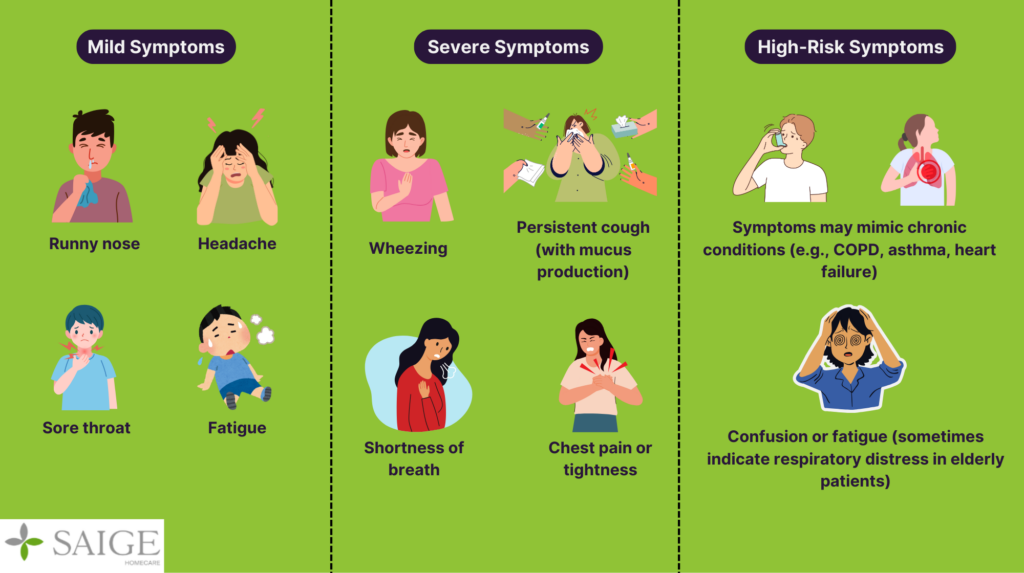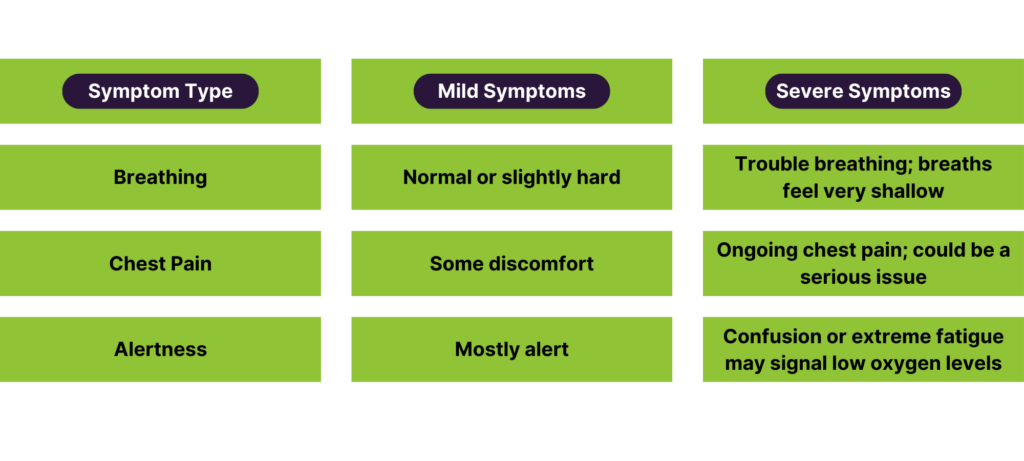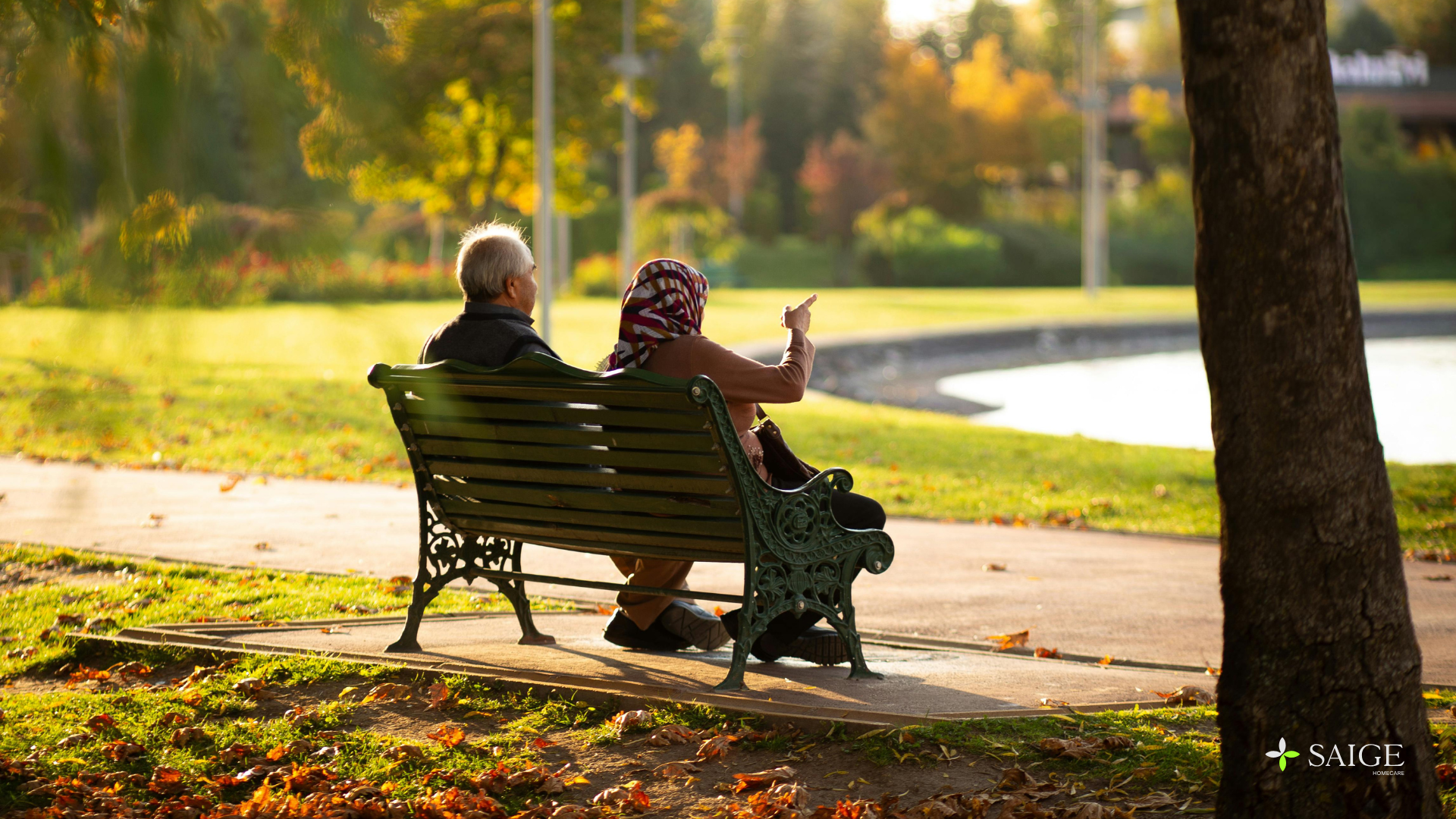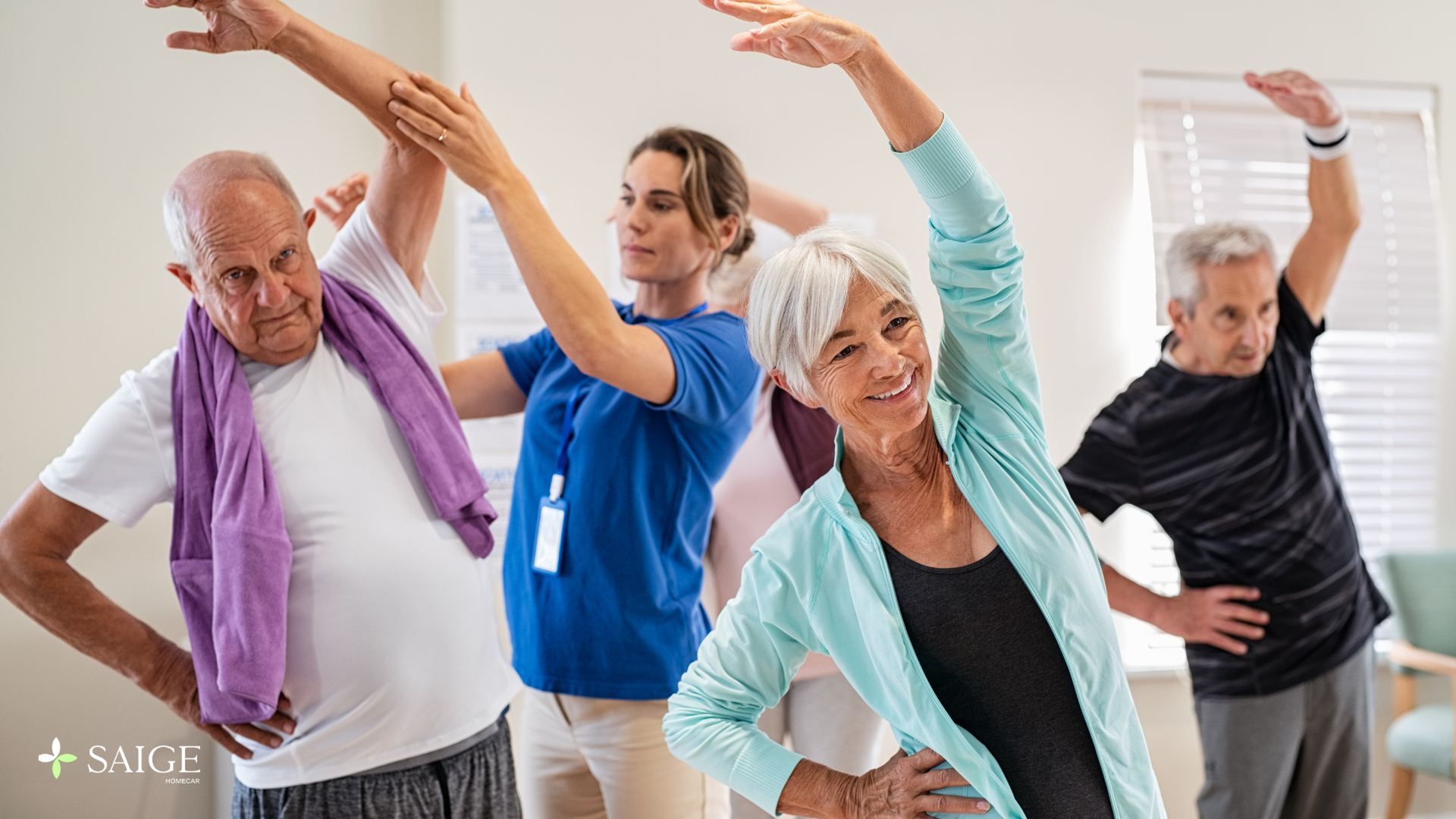RSV causes 60,000 to 160,000 hospitalizations in older adults each year. Winter leads to more indoor gatherings, increasing the risk of RSV transmission. Although often thought of as a childhood illness, Respiratory Syncytial Virus (RSV) can seriously affect adults, especially seniors.
With cases rising in the fall and winter, it’s crucial for caregivers and family members to recognize the symptoms and risks associated with RSV. This blog will take you through key signs of RSV, its potential complications, and practical tips for caregivers to help seniors stay healthy during the RSV season.
What is RSV and How it Affects Adults
Respiratory Syncytial Virus (RSV) is a common virus that can cause respiratory infections. It spreads easily through droplets from coughs or sneezes. You can also get it by touching surfaces that have the virus and then touching your face. Most people recover in about a week or two, but it can be serious for older adults and those with health problems.
Contrary to common belief, RSV can affect adults as well, not just babies. Unfortunately, around 10,000 older adults die from complications linked to RSV annually. This virus is especially risky for people with ongoing lung problems or weak immune systems. Being aware and taking preventive steps is important for protecting these at-risk individuals.
Key Symptoms of RSV in Adults
For adults, RSV symptoms can resemble those of a cold or flu, including:

In some cases, adults may develop a rash associated with RSV (RSV Rash). This rash can indicate a more severe reaction and should be monitored closely. If a rash appears alongside respiratory symptoms, it may signal a more severe infection that requires medical attention.
Identifying Mild and Severe Symptoms
Recognizing the difference between mild and severe symptoms is crucial. Severe symptoms may include:

Noticing symptoms early can help with prompt treatment. If you see severe symptoms, it’s very important to get medical help at the earliest. The quicker you seek treatment, the better your chances of avoiding serious complications.
Risks and Complications for Seniors
It’s vital to understand the risks and complications linked to RSV, especially for seniors who may be more vulnerable. Here are the main groups at higher risk and the complications they might face.
High-Risk Groups
Certain groups are more vulnerable to severe RSV infection, including:
- Seniors aged 65 and older: Their immune systems may not respond as robustly to infections.
- Individuals with chronic health conditions: Conditions such as asthma, COPD, or heart disease can exacerbate RSV symptoms.
- Immunocompromised individuals: Those undergoing treatments like chemotherapy or those with autoimmune diseases may have weakened immune responses.
Potential Complications
Complications from RSV can include:
- Bronchiolitis: Inflammation of the small airways in the lungs that can lead to breathing difficulties.
- Pneumonia: A serious lung infection that can lead to hospitalization, especially in older adults.
- Exacerbations of existing chronic conditions: RSV can worsen conditions like asthma or heart disease, leading to additional health issues.
Long-Term Effects
While many people fully recover from RSV, some adults may face long-term problems, like reduced lung function or additional breathing issues, especially after severe cases. Studies show that adults who have had RSV might be at a higher risk of developing asthma later in life.
Lifestyle Habits for Prevention
During Calgary’s cold months, seniors should focus on both physical and mental health. Eating well and staying active, even indoors, can improve mood and overall well-being. Joining local fitness classes or groups can help them stay active and healthy, making it easier to avoid illnesses like RSV.
Importance of Hygiene Practices
Preventing RSV involves adopting healthy lifestyle habits, including:
- Frequent hand washing: This is one of the most effective ways to prevent the spread of the virus. Use soap and water or hand sanitizer containing at least 60% alcohol.
- Avoiding close contact: Especially with individuals who show cold-like symptoms. If you know someone is sick, try to maintain distance until they recover.
Additional Preventive Measures
- Healthy Diet: Eating a balanced diet rich in vitamins and minerals can boost the immune system.
- Regular Exercise: Staying active helps maintain lung capacity and overall health.
- Avoid Smoking: If you smoke, consider quitting, as smoking can aggravate respiratory issues and increase susceptibility to infections.
Diagnosis of RSV in Seniors
Healthcare providers diagnose RSV based on symptoms, medical history, and seasonal patterns. They may use several diagnostic tests, including:
- Nasal swabs: To detect the virus directly.
- Blood tests: To check for other infections or complications.
- Chest X-rays: Sometimes used to assess lung involvement and rule out pneumonia.
Seasonal Patterns
As RSV cases often peak in the fall and winter, Calgarians should be particularly attentive during these months. The RSV season in Canada typically starts in late fall and lasts until spring, with most cases occurring from December to March.
The chilly weather encourages indoor gatherings, which can increase the risk of virus transmission during this time.
Treatment Options for Seniors
General Treatment Approaches
Treatment for RSV typically focuses on alleviating symptoms, which may include:
- Hydration: Staying well-hydrated is crucial to recovery, especially if fever is present.
- Rest: Allowing the body to recover is essential for effective healing.
- Over-the-Counter Medications: Pain relievers and decongestants can help manage symptoms. However, consult a healthcare provider before starting any new medication, especially for older adults.
When to Seek Emergency Care
It’s important to know when to seek medical help. Emergency care is warranted if you experience:
- Difficulty breathing: This is a sign that you may need immediate assistance.
- Severe dehydration: Symptoms can include dry mouth, dizziness, and decreased urine output.
- Chest pain: This could indicate a serious complication requiring urgent evaluation.
RSV Vaccination for Seniors
RSV poses serious health risks for older adults. Vaccination is essential to reduce severe illness and hospitalizations in this group.
Who Should Get Vaccinated
- Adults aged 75 and older should receive one dose of the RSV vaccine.
- Adults aged 60 to 74 with chronic health issues or living in nursing homes should also be vaccinated.
Available Vaccines:
- Arexvy (GSK)
- Abrysvo (Pfizer)
- mRESVIA (Moderna)
Many locations offer the RSV vaccine free of charge to eligible seniors. In Calgary, for example, seniors aged 60 and older living in continuing care facilities can receive the Abrysvo vaccine for free. Additionally, those aged 75 and older in the community can also access the vaccine at no cost.
Benefits and Risks of RSV Vaccination
Benefits:
- Lowers the chance of getting RSV.
- Reduces the severity of illness if infected.
- Decreases the risk of hospitalization.
Risks:
- Mild side effects like pain at the injection site, fatigue, and fever can occur.
- Serious side effects are rare.
The vaccine is administered as a single dose, providing protection for at least two years. It’s recommended that you get vaccinated in early fall, before the RSV season peaks.
For those in Calgary, appointments for the RSV vaccine will start on October 21, 2024, and can be booked through the Alberta Vaccine Booking System or by calling Health Link at 811. The vaccine will be available at select pharmacies and Alberta Health Services public health centers, aiming to protect older adults during the RSV season.
Ongoing Research
Research is ongoing to develop more effective vaccines. As new data emerges, recommendations may change, so staying informed about vaccination options is crucial for seniors. Vaccination not only protects individuals but also helps to reduce the overall incidence of RSV in the community.
Role of Caregivers and Family Members
Caregivers and family members are vital in supporting seniors during RSV season. Their awareness can significantly influence the health of older adults. Here are some simple tips for recognizing symptoms and providing support:
Recognizing Symptoms
- Watch for changes: Pay attention to signs like increased fatigue, difficulty breathing, or persistent cough.
- Stay educated: Learn about RSV symptoms so you can identify potential issues early.
- Encourage communication: Ask seniors how they feel and listen to their concerns.
Providing Support
- Prompt doctor visits: If symptoms arise, encourage seniors to see a healthcare provider quickly.
- Help with medications: Ensure that seniors take their medications as prescribed.
- Promote hygiene: Encourage good hygiene practices, like frequent handwashing, especially during Calgary’s colder months when RSV transmission increases.
Emotional Support
- Be patient: Offer understanding and reassurance, as health concerns can be stressful for seniors.
- Encourage social interaction: Help seniors stay connected with family and friends, especially in places like Calgary, where long winter months exist, which can lead to increased feelings of isolation. Simple phone calls or video chats can lift their spirits and provide a sense of community.
By being attentive and supportive, caregivers and family members can significantly impact seniors’ ability to navigate RSV season safely and healthily.
Protect Your Health: Managing RSV in Adults
Understanding RSV is important for seniors and their caregivers. Be aware of the symptoms and risks to help prevent serious health issues. Make sure you or your loved ones get vaccinated to protect against RSV.
Stay informed about the virus and share what you learn with others. Practice healthy habits like good hygiene, eating well, and staying active to boost your immune system. By taking these steps, you can manage the RSV season with confidence and protect your health this winter. Your well-being matters – take action today!
Related Reads
Tips to Keep Seniors Active and Moving at Home
Home Safety Checklist for Aging in Place
FAQ’s on RSV in Adults
How long does RSV last in adults?
RSV symptoms usually last between two to eight days, but they can persist longer, particularly if they lead to more serious health issues.
Is RSV contagious?
RSV is highly contagious and spreads through droplets from coughs or sneezes of an infected person. The virus can also survive on surfaces like counters and doorknobs for hours. If you touch these surfaces and then touch your face without washing your hands, you can get infected.
Does RSV need antibiotics?
No, RSV does not require antibiotics because it is a viral infection, and antibiotics only treat bacterial infections. However, RSV can be more serious for older adults, and some may need to go to the hospital for monitoring and support with breathing or dehydration.
What is the best medicine for RSV?
The best medicines for RSV include the antiviral drug ribavirin, which is used for severe cases in high-risk individuals, and bronchodilators to help open the airways and ease breathing. Always consult a healthcare provider for appropriate treatment options.
What is the fastest way to get rid of RSV in adults?
There is no cure for RSV, but adults with mild cases can use home remedies like honey and over-the-counter cough medications to ease symptoms. Those with more severe illnesses may need additional support, including oxygen therapy, steroids, and IV hydration.
What are the stages of RSV in adults?
In adults, RSV symptoms resemble common cold symptoms, including a congested or runny nose, headache, and sore throat. After exposure to RSV, symptoms typically appear within 4-6 days and can last from 2 to 8 days. Most cases are mild and resolve on their own.
Is a hot shower good for RSV?
While there is no specific treatment for RSV, steam from a warm shower can help relieve congestion. Other options include using a cool-mist humidifier or saline nasal drops or spray.


